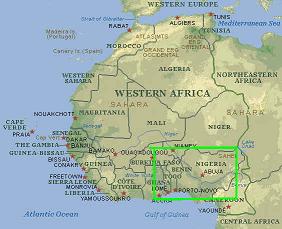 |
A large part of Vodou is based on the African religions from the areas of Nigeria, Benin, and Togo.
These are the areas in which the Yoruba people lived.
The Yoruba people have been in Africa for approximately 2,500 years.
Their religion centers around a Gran Met, or Grand Master, Olorun
as well as about 400 lesser spirits. These lesser spirits were
humans who lived exceptional lives.
The aspects of the Yoruba religion include prayer, animal sacrifice,
and a belief that life and death are intertwined.
In the 16th to 18th centuries, French and Spanish slave traders
arrived in Western Africa. They raided the land and forced
the native peoples into slavery. Many of these slaves were brought
to Haiti and forced to work the land. They were treated very
harshly so that they would fear their "master" and not attempt
to escape for fear of even worse treatment. Many slaves committed
suicide to end the pain. Others aborted their pregnancies so
as to not bring a child into such a rough life.
|
|
In these difficult times, the slaves needed something more
to get them through the long days of harvesting cotton, coffee,
tobacco, and sugarcane. They coped by remembering their old lives
in Africa. They clung to their religions to give them hope.
The slaves had to hide their native religions, as the French and
Spanish forced Catholicism on them. Baptisms were mandatory, and
worship of their old religion was prohibited. In order to avoid
scrutiny from their captors, the slaves "merged" their religious
beliefs with those of Catholicism. They gave the appearance
of Catholic worship, when in fact, they were worshipping their own
spirits. Eventually, the slaves began to like some of the ideas of
Christianity, and believed it to be the same as their own religions,
with God and the "lesser spirits" merely being called by different names.
A comparison between Voodoo and Catholicism is outlined
in the next section.
|

